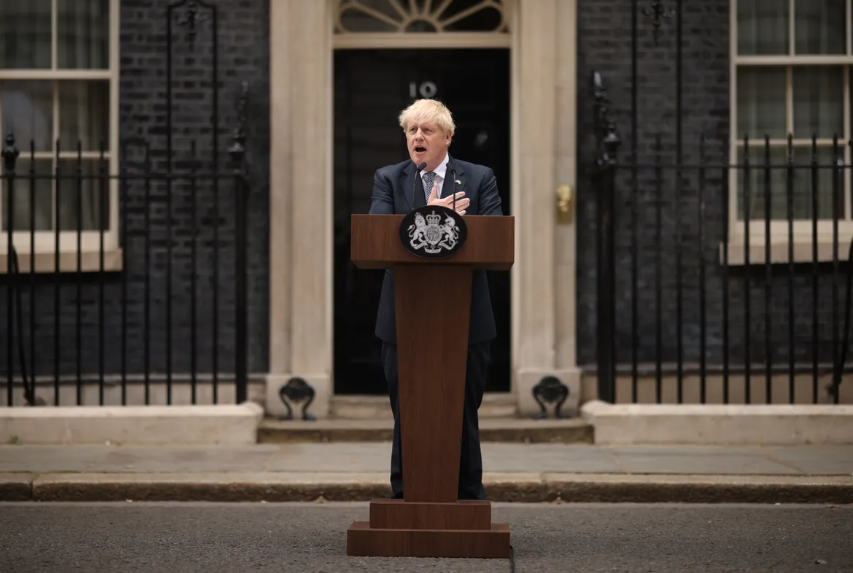Boris Johnson has promised his cabinet he will not use his remaining time as prime minister to make “major changes of direction.”
The PM has caved in to pressure from ministers to quit as Tory leader but wants to stay in #10 Downing Street until the party chooses who should replace him, the BBC reports.
His collapse in support has prompted some Tories to urge him to go now.
But a newly promoted cabinet minister says Johnson has agreed to carry on as a “caretaker” prime minister.
An official timetable for a Tory leadership race is expected to be confirmed next week, with potential contenders already jockeying for position.
There is no set duration for such a contest, but a new leader, who will become the prime minister, is expected by September.
Attorney General Suella Braverman and backbench MP Tom Tugendhat are the only Tory MPs to confirm they will stand so far, but more declarations are expected in the coming days.
Launching his bid with an article for the Daily Telegraph, Tugendhat promised tax cuts and “new energy and ideas” for government.
The BBC has been told former health secretary Sajid Javid and Transport Secretary Grant Shapps, who were part of the cabinet revolt against Johnson, are considering leadership bids.
Foreign Secretary Liz Truss, former chancellor Rishi Sunak, and ex-foreign secretary Jeremy Hunt are among others tipped to run.
Former Brexit secretary Steve Baker has said he is “seriously” considering running — but former levelling up secretary Michael Gove and deputy PM Dominic Raab have ruled themselves out.
Former PM Sir John Major is among Tories suggesting Johnson should quit as PM immediately, arguing it would be “unwise” for him to stay until he is replaced.
Major has suggested to party bosses the leadership contest should be speeded up, or if not deputy PM Dominic Raab should become caretaker PM.
Labour has also threatened to try to unseat Johnson immediately through a parliamentary vote of no confidence, although this would need considerable support among Tories to succeed.
At a cabinet meeting earlier, Johnson told ministers he would not seek to implement “major changes of direction” or take “major fiscal decisions,” according to Downing Street.
“I don’t expect you will be browbeaten by No. 10 to do radical or strange new policies,” he told them, but he added there was “no excuse to take your foot off the pedal.”
Johnson joked that the team around the table, which included several new faces to fill posts vacated by recent resignations, was his “best cabinet ever.”
Speaking to BBC Newsnight, newly promoted Welsh Secretary Robert Buckland said Johnson had agreed to serve as a “caretaker” prime minister.
“That is very, very clear. And that is what cabinet established clearly today,” he added.
Johnson’s departure followed a mass revolt by ministers over his leadership, sparked by his handling of sexual misconduct allegations against former deputy chief whip Chris Pincher.
He initially tried to resist calls to quit by replacing ministers who abandoned him, until it became clear that he had lost the confidence of his party and could not continue.
It was the latest row to engulf his premiership in recent months, with his authority among Tory MPs eroded after a series of scandals including his Partygate fine, and a row over whether he misled Parliament over lockdown parties in No. 10.
Making his resignation speech earlier, Johnson justified his initial decision to cling to power by saying he felt obliged to deliver on his “incredible mandate” from the 2019 election.
He blamed his departure on the “herd instinct” at Westminster, and said it would be “painful” not to deliver on “so many ideas and projects.”
He cited taking the UK out of the EU and the government’s Covid vaccine program as among his achievements in office.
Addressing the Ukrainian people, he said: “We in the UK will continue to back your fight for freedom for as long as it takes.”
Johnson has spoken to President Zelensky of Ukraine, reassuring him his successor would remain as committed to Ukraine as he said he had been.


